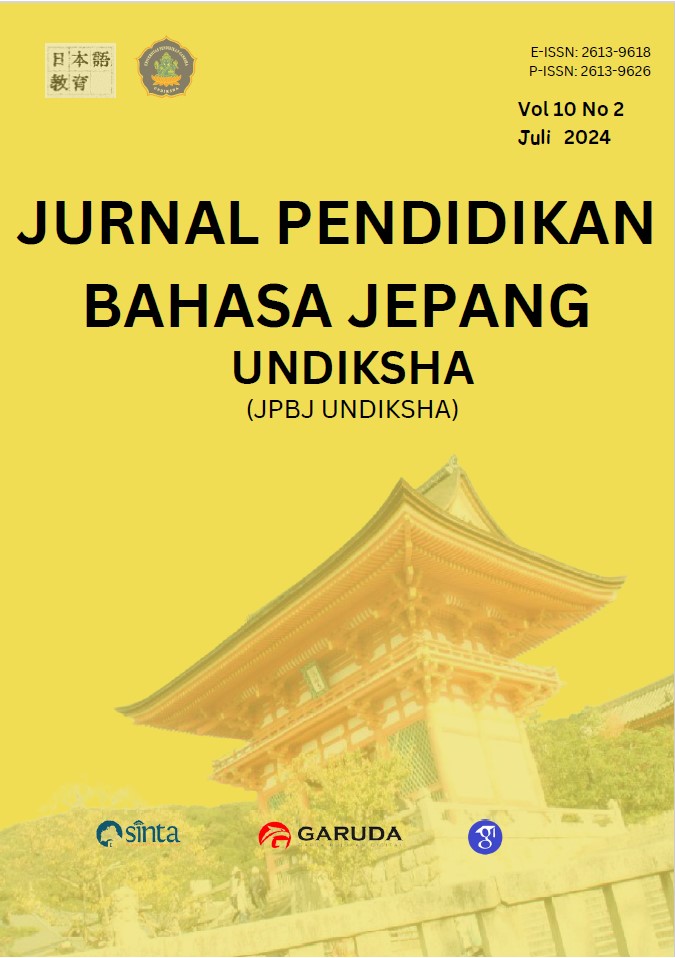Perbedaan Makna Modalitas Kamoshirenai Dan Osore Ga Aru Pada Kalimat Berita
DOI:
https://doi.org/10.23887/jpbj.v10i2.71549Kata Kunci:
Kamoshirenai, Osore ga Aru, Epistemic Modality , Possibility , MeaningAbstrak
This research explores the diverse modalities within the structure of Japanese sentences, focusing on the modality of possibility known as "kanousei". Specifically, it delves into the distinctions between two forms of this modality: "kamoshirenai" and "osore ga aru," employing Iori's theory. Data collection involved the observational method, the basic technique used in this method is Simak Bebas Libat Cakap (SBLC), and taking notes as advanced techniques. 15 data points were gathered from news websites, comprising 8 sentences with the "kamoshirenai" modality and 7 with the "osore ga aru" modality. Subsequently, the data were analyzed using agih method. The analysis revealed that "kamoshirenai" expresses the possibility of an event, conveys the speaker's opinions or assumptions, and can indicate causal relationships. On the other hand, "osore ga aru" carries a similar meaning to "kamoshirenai," yet it nuances an undesirable outcome as perceived by the speaker.
Referensi
Alek, Linguistik Umum, Jakarta: Penerbit Erlangga, 2018.
A. Chaer, Linguistik Umum, Jakarta: Rineka Cipta, 1994.
E. I. H. A. Rini, L. Rosliana, Buku Ajar Linguistik Bahasa Jepang, Semarang: Undip Press, 2021.
H. Alwi, Modalitas dalam Bahasa Indonesia, Yogyakarta: Penerbit Kanisius, 1992.
H. Kridalaksana, Kamus Linguistik, Jakarta: Gramedia Pustaka Utama, 2009.
I. Iori, Atarashii Nihongo Gaku Nyuumon Kotoba no Shikumi wa Kangaeru, Tokyo: 3A Network, 2001.
Kurhastanti, U. Yuwono, dan M. RMT. Lauder, Pesona Bahasa: Langkah Awal Memahami Linguistik, Jakarta: Gramedia Pustaka Utama, 2009.
N. A. Praditasari, "Modalitas Kamoshirenai dalam Kalimat Bahasa Jepang", Skripspi, Fakultas Ilmu Budaya, Universitas Diponegoro, Semarang, Indonesia, 2019.
R. Satiti, A. Aibonotika, dan Charlina, "Makna Modalitas Osore Ga Aru," Jurnal Online Mahasiswa Fakultas Keguruan dan Ilmu Pendidikan Universitas Riau, vol. 9, no. 2, pp. 3-4, 2022.
Suhardi, Pengantar Linguistik Umum, Yogyakarta: Ar-Ruzz Media, 2013.
Y. Nitta, "Kanosei Gaizensei wa Arawasu Giji Mo-do," Kokugo to Kokubungaku, vol. 58, no. 5, p. 90, 1981.
Unduhan
Diterbitkan
Terbitan
Bagian
Lisensi
Hak Cipta (c) 2024 Jurnal Pendidikan Bahasa Jepang Undiksha

Artikel ini berlisensiCreative Commons Attribution-ShareAlike 4.0 International License.



